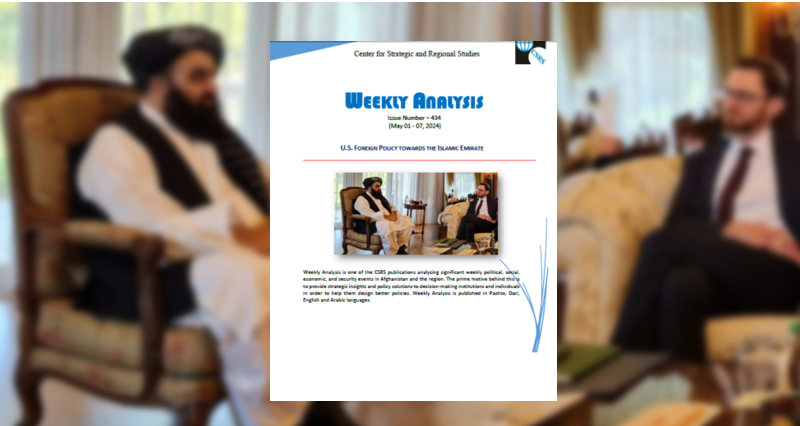U.S. FOREIGN POLICY TOWARDS THE ISLAMIC EMIRATE
By: Center for Strategic & Regional Studies
Note: Click here for the PDF file of this analysis.
___________________________________________________________________
In this issue:
- S. Foreign Policy Towards the Islamic Emirate
- Introduction
- Interaction Between the Islamic Emirate and the U.S
- Should The U.S. Officially Recognize The Islamic Emirate?
- Specific Objectives of U.S. Foreign Policy Towards the Islamic Emirate
- Conclusion
- Suggestions
- Reference
- _____________________________________________________________
Introduction
The United States’ foreign policy towards the countries of the world and the region has varied under different presidents. However, before World War I, some foreign policy scholars proposed theories regarding U.S. foreign policy that later evolved into the main schools of thought in American foreign policy. There are three major schools of thought in U.S. foreign policy that influence how the United States organizes its foreign affairs. These schools are as follows:- Hamiltonism: This school of thought posits that U.S. foreign policy should be based on American values rather than national interests, but these values should be accepted in other countries without war and intervention. The U.S. should first embody these values as a model and then voluntarily encourage their adoption in other countries. In essence, this school is value-driven rather than interest-driven and opposes intervention and war in other countries.
- Jacksonism: This school is grounded in realism and advocates for the use of power in international politics. Unlike Hamiltonism, Jacksonism focuses on security in foreign policy and the pursuit of U.S. national interests. Jacksonism has three core principles:
- Intervention in various countries and regions to achieve, maintain, and expand U.S. national interests.
- Preserving and enhancing the position of the U.S. as a power in the international system and using power and force as needed in this regard.
- Immediate response to threats against U.S. national interests.
- Wilsonism: According to this school, the U.S. imposes American values on others through its foreign policy, including intervention and war. This school prioritizes enduring American values over transient national interests and organizes foreign policy to Americanize the world, imposing American values globally, and using force if necessary. According to this school, the U.S. sometimes engages in war and intervention to implement these values worldwide, even if such actions contradict national interests. When national interests and values conflict, values should be prioritized. The difference between Hamiltonism and Wilsonism is that Hamiltonism does not accept war and intervention to implement American values, whereas Wilsonism permits war and intervention for this purpose.
Interaction between the Islamic Emirate and the U.S.
Interaction means that the United States engages in various dialogues with the Islamic Emirate, provides humanitarian aid, and discusses the future with it, but does not formally recognize it nor sever ties. This approach keeps multiple avenues for negotiation and understanding open, without either side imposing all its conditions on the other. With changing circumstances, the future of the relationship between the two countries may become clearer. When the Islamic Emirate regained power in 2021, the U.S. found itself in a complex position. On one hand, it wanted to condemn the Islamic Emirate for human rights violations, ties with international terrorist groups, and the failure to form an inclusive government. On the other hand, it sought to engage in dialogue about Afghanistan’s future, provide humanitarian aid, acknowledge economic progress, and encourage efforts to eliminate ISIS. To achieve the first goal, the United States imposed sanctions on the Islamic Emirate, froze Afghanistan’s central bank assets, and restricted the travel of its leaders. To achieve the second goal, it allowed international aid agencies to operate, helped stabilize the Afghan currency by sending $40 million weekly Through United Nations, organized Doha conferences, and secured a special budget from Congress for humanitarian aid. Looking at the situation, the United States is at a crossroads in its relationship with the Islamic Emirate. It cannot completely sever ties, nor can it formally recognize it. Hence, it has adopted a third approach—engaging with the Islamic Emirate in some areas while pressuring it to reform others. In summary, the current U.S. foreign policy aims to remain engaged with the Islamic Emirate and negotiate about the future. This policy might be driven by the following reasons:- Humanitarian and Economic Crisis: The U.S. does not want to be blamed for the humanitarian and economic crises in Afghanistan, as it would damage its international standing. Other major powers might use this as propaganda to claim that the U.S. leaves crises in its wake wherever it goes. Thus, the U.S. aims to Engage with Islamic Emirates through United Nations and provide humanitarian and economic assistance to Afghanistan.
- Strength of the Islamic Emirate’s Political Power: The United States has realized that, over nearly three years of governance, the Islamic Emirate has established complete political control, maintained security, and solidified its central authority. Therefore, the U.S. does not want to completely lose influence in this region and acknowledges that it needs to engage with the Islamic Emirate to pursue its objectives.
- Active Diplomacy and Relations with Regional and Neighboring Countries: The Islamic Emirate has active diplomatic relations with Iran, China, Central Asia, Turkey, and Russia, and these relations are strengthening. If the U.S. were to completely sever ties with the Islamic Emirate, it would fall entirely into the hands of its adversaries, which the U.S. wants to avoid. Hence, the U.S. seeks to maintain engagement with the Islamic Emirate.
- Islamic Emirate’s Desire to Revive Relations with the West: Another factor is that the Islamic Emirate wants to revive its relations with the West, especially the U.S., and is ready for dialogue in this regard. Given these conditions, the U.S. cannot avoid negotiations and dialogue, thus it is engaged in various talks with the Islamic Emirate.

